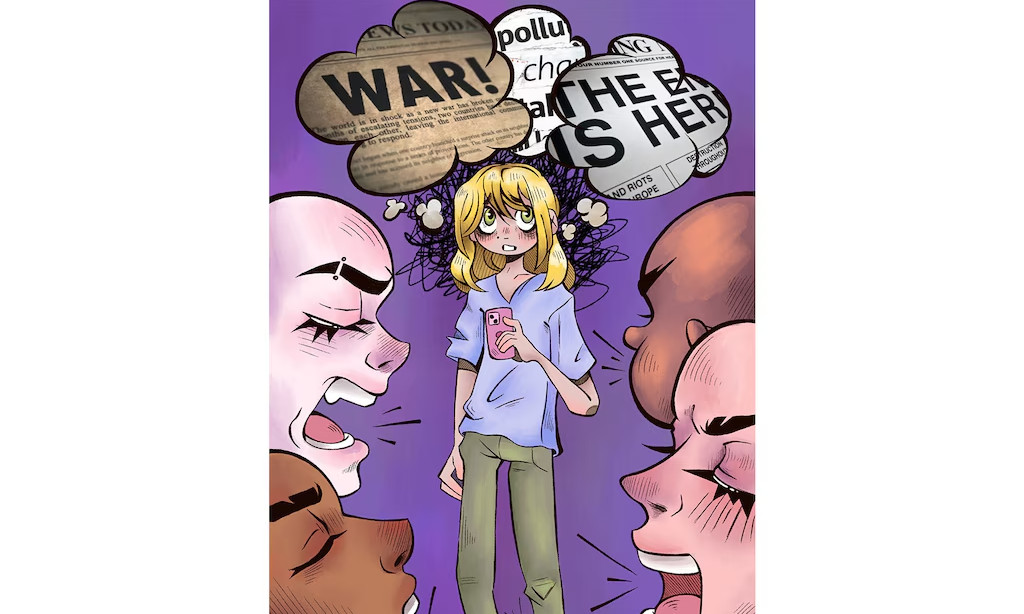Note to readers • This is part of a collaborative project between The Salt Lake Tribune and the Highland High School Rambler. Amplify Utah is publishing the work through its ongoing partnership with the Tribune to elevate diverse perspectives in local media through student journalism. Read more about these young Utahns’ experiences here.
It could be as simple as glimpsing a news headline over someone’s shoulder. Or overhearing students in the hall talking about the latest political issue. Or even opening a social media app to see someone’s post about a new issue they want you to know about. Sometimes it doesn’t take much to send your mind into a spiral.
As someone who’s experienced anxiety most of my life — but especially during high school — I’m familiar with that sudden rush of negative, nervous energy.
While knowing what’s going on nationally is important, it’s also impossible to ignore the uncertain, helpless feeling that comes with staying informed. Sometimes it feels like a pebble settling into the bottom of your stomach; other times it feels like a tornado in your mind. What if it affects someone close to you? What if it affects you? What if it changes your future?
Among the broad range of topics we hear about daily, there are a few that give me and my fellow Gen Z students more anxiety than others. Allow me to elaborate:
Climate change
With the constant headlines about natural disasters like uncontained wildfires or freezing temperatures in the South, climate change is a major contributor to anxiety. Summers now are hotter than before, often breaking records.
Knowing this causes endless questions to run through our minds: What happens when we run out of water? Will some places become so hot and dry that we won’t be able to live there? Will this be the summer an earthquake hits us?
The climate is something that directly affects our futures — I’m only a senior and have most of my life left to live — but there’s no easy way to fix it, and that’s anxiety-inducing.
Artificial intelligence
Along with climate change, the rise of artificial intelligence is another topic crossing our screens and adding to our increasing anxiety. This prompts the following questions: How will we pick our majors if we don’t know what AI will look like a few years from now? Will all the jobs be taken? Will we still have human interactions?
The future
I know I get anxious thinking about the uncertainty of the future, and I know I’m not alone in this. So many teens are afraid of what will happen in the next few years. And when we’re forced to be aware of so much — locally and nationally — what happens to our minds?
Our anxiety increases.
In 2024, the National Institutes of Health reported that more than 30% of adolescents have some type of anxiety disorder — that’s only counting those with an official diagnosis — which was higher than any of the past generations.
I believe that part of the reason so many of us young people experience anxiety is our access to information. We’re hit with all these adult issues constantly without the lived experience, maturity or skills to compartmentalize — we’re not taught how to not obsess over the bad things.
But it’s not only the internet that can trigger anxiety, sometimes it’s a teacher who wants their students to be informed, or it can be a parent who doesn’t want to send their kids to college without knowing what’s going on in the world. It seems like teaching us about the world is the right thing to do — but look at how it’s affecting us.
What’s worse, though? Being in the dark about what’s happening and living in a false sunny bubble or being in the know and feeling uncontrollable anxiety about the future?




